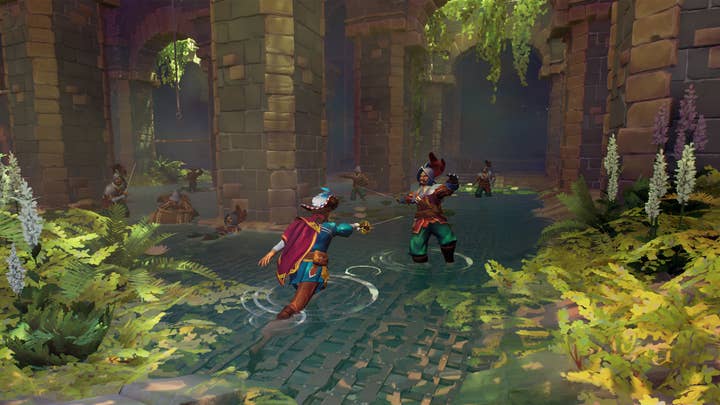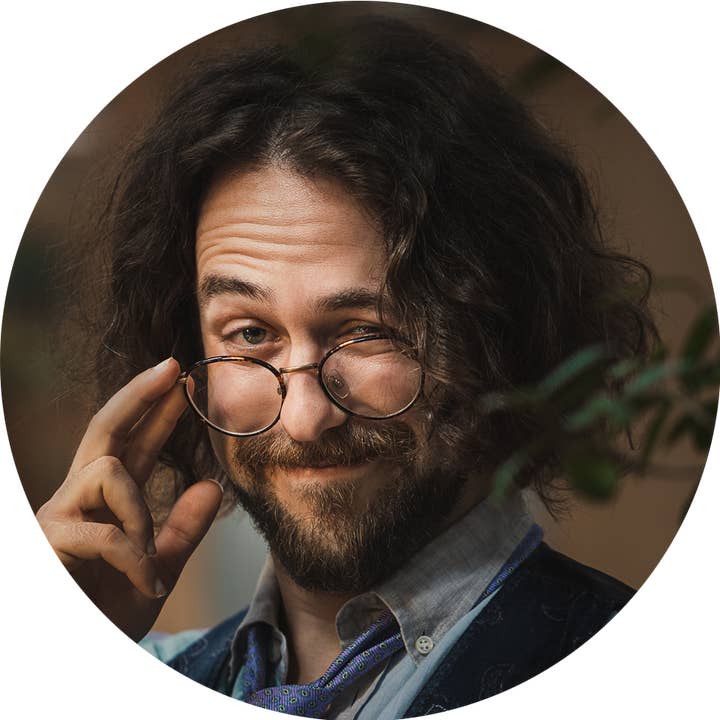En Garde developers on the challenges of founding a studio early in your career
Fireplace Games co-founders talk about the journey from making a student game to establishing a whole studio to remake it
For many, it was the surprise of the Future Games Show: En Garde, a colourful fencing action game that pits you against large groups of enemies as experienced swashbuckler Adalia de Volador.
The humorous tone and polished look perked many players' interest, making En Garde one of the most popular demos during the summer 2023 Steam Next Fest.
The game (which is launching next week) began its life as a graduation project by Fireplace Games' eight co-founders at Supinfogame Rubika (now simply Rubika), France, which the team later uploaded to itch.io.
"We didn't think about doing anything more with it at first," says CEO Anaïs Simonnet. "Actually, when we put it online, we had a lot of messages from people who told us they liked it, and publishers and investors were also really interested in it. That was a surprise for us."
"I started to realise that the gaming industry was not as ideal as I thought when I was a student and I had a strong desire to one day make something else"

"While there is a continuity, it's not like we went out of school, got good feedback, and then founded Fireplace Games," adds Julien Fenoglio, Fireplace's concept artist and writer. "Each of us spent about two years either working in bigger studios or freelancing. It was this time that gave us ideas on how we wanted to run a studio, because we had a taste of how bigger studios operate and how other people were doing."
There was no inciting incident that led to Fireplace's foundation, however. Instead, Simonnet describes herself and her co-founders as a group of developers who were slowly but surely looking for something new.
"I think everyone in the team has different reasons to join the adventure. I know that, for me, it was that I wasn't feeling really good in my job. And I started to realise that the gaming industry was not as ideal as I thought when I was a student and I had a strong desire to one day make something else, just to try to launch my own company and try to do it differently," Simonnet says.
"But that was more of a long term dream. And when we had the opportunity offered to us, I thought maybe it's the right time. I think all the people in the team felt that something was lacking in their job and they wanted to try new things that they couldn't do in the big companies they were working in. And of course there were just a few of us that were really driven by the project itself."
While Simonnet and Fenoglio admit that the rare luck of having funding offered to them to make En Garde led to Fireplace Games' founding, Simonnet says she was – and is – cautious.
"A condition for a lot of us was that we wouldn't start the company if we didn't have a finance deal ready to sign. We were really young and really afraid of the financial aspects of launching a company because when you have an intern's or junior's salary, and you start calculating the costs of a video game, it's really overwhelming," she says.
"We didn't want this experience to feel like a trap for anyone in the project. We discussed the possibility that maybe in six months one of us would change [their] mind and go back to [their] previous job, and that was okay. We had weekly discussions about what we wanted to do with the project for more than six months. We already had the investment deal ready to sign before we launched the company because we really wanted to be very, very cautious."
Simonnet doesn't discount the idea of founding a studio straight out of school, because she knows that it can sometimes look like the best option for juniors, due to the lack of entry-level positions across the industry. However, she still thinks of the experience all of them gathered by working elsewhere first as vital.
"When you're a student, you learn how to make video games, and when you start working in the industry you realise that, actually, no one really knows what they're doing," she says. "Even at the biggest studios, developers sometimes don't know if a game is going to ship until the last minute, and I think for students this can be a shock. You have to learn to be agile in your approach, and as a student you have very little need to."

The team also learned more about game design and marketing during their roughly two years away from En Garde, realising that a game they previously thought of as almost flawless could be improved upon in many ways. Simonnet, who originally trained as a character artist, also took on the entirely new challenge of becoming Fireplace Games' CEO, a learning process she considers to be ongoing.
"There's a lot of theory you can learn from books and YouTube videos, and at first that's what we did, just to learn the vocabulary of running a business, none of which you learn at game design schools," she says. "That basic understanding allowed us to talk to more experienced people who lived through actual studio launches and game releases. From their experience you can anticipate what can go wrong, which is extremely helpful."
Simonnet now thinks of her shift from a creative capacity to managing a studio as permanent, something she describes as a better fit for her than character design.
"I realised that a lot of character artists in games focus completely on being artists, and I don't have the same creative drive," she admits. "I'm really good at understanding people's wants and sympathising with them and helping them make something happen. I might not be the best artist, but I'm really good at understanding creative processes and the practical aspects behind them. I don't know how to code for example, but I do know how to ask the right questions in order to help a programmer."
"We had the chance to represent a specific group using our experience, and I hope some people will relate to that"

Asking the right questions is essential to Simonnet, who describes herself as more of a facilitator than a leader.
"I'm not the kind of CEO with a big vision that I want others to follow," she says. "It's the other way around. I listen to what everyone wants to make, and then I find a compromise and make decisions that are good for all of us."
Compromising and communicating in particular is a skill Simonnet wants more people in games to develop, no matter their role.
"You can be very good on a technical level, but if you can't communicate to other people what you're doing and if you can't find a way to make teamwork work, then that's a problem and it's a big problem in our industry," she says. "The skill to communicate a compromise is hopefully what teamwork should be."
Fenoglio, who was an art student at Rubika, has also taken up another role, and is now both a writer and a concept artist. However, he doesn't consider this change to be particularly radical.
"I've started as art director for the studio, then I ended up more of a writer, but I'm also a concept artist – I've always stayed in the purview of art craftsmanship, so it's not a huge shift," he says. "Because the project was very horizontal in the first year, I got an understanding of how a lot of things in games work. I used to think 'who needs managers or marketers, we'll just make good art and that's it' and now I know both are absolutely essential."
Simonnet and Fenoglio say they both believe in En Garde's potential for success because they stuck to what they know – it is a game talking about swashbuckling, a large part of French culture, even though the game itself is set in Spain.
Because it is an action game with a strong focus on combat, both describe En Garde's overall narrative potential as 'limited'. There is no space for particularly long conversation, and the overall comedic tone also limits the number of topics the game touches on.
However, both are limits the team willingly set and accepted, and yet it was important to Fireplace Games to state their values in their work wherever possible.
"We want to be careful to show people our beliefs, but not talk about them unless we have the space to do that really well"Anaïs Simonnet
"It was an interesting challenge," Fenoglio says. "We know that the medium we work in can be quite limited. The verbs you use to interact with in the game are limited, and that's where our game shines. But it also means the only way to bring topics like sexism up is by enemies remarking on the fact that Adalia is a woman, and what's that going to do? You beat them, that's not a meaningful revenge."
Simonnet adds: "Our character is a bisexual woman because that's what I can speak to. I thought it was nice for a player to see a woman kicking butt, because we know what it's like when a woman is just doing her thing and gets harassed, it feels good to have her fight back. But overall, this isn't important for us – there are great games that talk about important topics in detail, and we knew we weren't able to do that. So we want to be careful to show people our beliefs, but not talk about them unless we have the space to do that really well."
However, coding Adalia was still a deliberate narrative choice. "We wanted to make an actual, good representation of a bisexual woman because it's still very limited."
"We had the chance to represent a specific group using our experience, and I hope some people will relate to that," Fenoglio adds. "It also gave me an opportunity to learn something – I realised there's a specific bisexual way of flirting, which I learned from sensitivity readers we worked with."
"We could have [taken] a careful approach. But we were too impatient, we're immediately making what for us is a big game"Anaïs Simonnet
On its website, Fireplace Games states its company motto, 'Making games with panache'. Panache can mean many things – some of the word's literal translations are flamboyance, confidence and style. For the studio, panache is an entire business philosophy.
"It's a word to describe what we did, really – being given money to make a game as juniors in the industry can be overwhelming, and even with all the preparation we did, things can go wrong, so we thought, okay, at least we'll all be doing it together, let's try to have fun," Simonnet says. "Each time we had a difficult situation, we chose to take a risk. There was a point where we had to start work on the entire game over, where we had almost no money left and the game wasn't working, and we thought: let's try new things, let's be brave, what's the point otherwise."
Asked to elaborate, Simonnet explains what a careful approach to making games looks like to her: "We could have followed a more long-term strategy for the studio. Make a few small games first, take a careful approach. But we were too impatient, we're immediately making what for us is a big game. We have the option to say: if it doesn't work, we'll do something else.
"I may be paraphrasing this, but [1897 play] Cyrano de Bergerac gives panache a sort of double meaning – on one hand it means to be coy, and on the other it means the refusal to give in to tragedy, and that's what we want to be."
Sign up for the GI Daily here to get the biggest news straight to your inbox
.png?width=720&quality=70&format=jpg&auto=webp)
